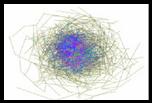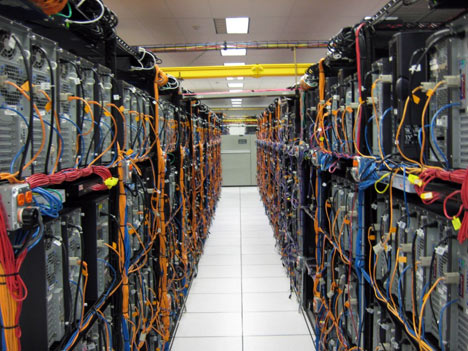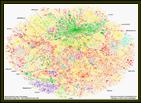







These
figures show, in order, (1) a peer to peer system (Gnutella), (2) a
datacenter, (3) an IoT/sensor network, (4) the Internet ISP topology.
[Tuesdays and Thursdays] @ [9.30 AM - 10.45 AM] @ [Zoom (access via G Apps at Illinois)]
Instructor: Dr. Indranil Gupta ("Indy"), indy at illinois dawt edu, Zoom/3112 SC.
[Zoom for Class sessions] To access this google doc, please sign in using Google Apps at Illinois (NOT your gmail account).
Indy's Office hours: Right after Zoom sessions Tuesdays and Thursdays 10.45 am - 12.00 pm on Zoom (different link - see Piazza).
TAs: Beomyeol Jeon (bj2@illinois.edu), Atul Sandur (sandur2@illinois.edu). Office hours by appointment.
Class Discussion Forum: Piazza
MCS-Coursera Only: Link (this is only a shell! please use the current website--the one you are viewing now, not Coursera!--for all activities)
[Mediaspace Recordings of Zoom Lectures] (first 3 weeks only)
Signup Form For Presenters/Scribes (coming January-end!)
This is a course on distributed systems. It brings together research centered in cloud computing, peer-to-peer systems, distributed algorithms and on sensor networks. The course reviews classical work in these scattered areas of distributed computing research, and explores overlaps across them. The course has one semester-long project that is aimed at producing either an entrepreneurial effort for industry or a conference/workshop-quality research paper. The entrepreneurial effort must make a technological case and a reasonable business case for innovation in today's world. The paper must address an open research problem, prove bounds and/or propose new algorithms, and contain analytical and experimental evaluation. Previous course projects have had high success rates at conferences/workshops (see past CS525/CS598IG projects at the bottom of this page). Three to five "best projects'' at the end of the semester will be earmarked for expedited submission to a renowned conference, with the help of the instructor's involvement even after the semester is over.
Experimental
Testbeds:
All students will get access to a few VMs in the CS VM
server farm (details forthcoming in Feb). Students can also request
course staff for an
Emulab project (there are limited
number of slots available for each, or a PlanetLab slice. Please note: (1) all requests will be granted
on an as-needed basis, and (2) you will be given an account on typically only one of these last two testbeds, so please choose carefully
depending on your project requirements! In general, there are plenty of
cluster resources available in the department, so try to procure some
of those! (alternately, AWS and sometimes Google cloud/Azure give out
student grants, which you have to apply for individually).
Congratulations to all winners and runners-up! And also congrats to all other projects. As mentioned in class, all projects are worth continuing after the semester is over, regardless of whether they appear in the above list. Please reach out to Indy in summer or early Fall.
1/29/21: Course web page online. Happy New Year 2021! All updates will be posted on Piazza (link coming soon).
Policies on Ethics, Attribution and Cheating
Reviews: You may discuss papers with others in the class, but reviews should be written independently. In other words, if two reviews are found to have been copied from each other, both students will be penalized. The best way to ensure that you are safe is by mentioning right at the top of your review that "This review was written after discussion with Mr. John Doe and Ms. Jane Joe".
Presentation: Your work (presentations and reviews) should be original and independent, although you are allowed to cooperate with your partner for your session. Reusing slides from someone else's presentation should be done only if it is absolutely necessary, but should be acknowledged right at the beginning of the presentation.
The standard university policies on original work, cheating and attribution apply to all work in the course. Violation of these may result in either lowering of course grade by one letter, or failing the course, or a different final decision left to the instructor.
A Sampling of Past CS525/CS598IG Projects that were Subsequently Published in Conferences/Journals (check http://dprg.cs.uiuc.edu for copies of papers)
Select Spring 2016 CS525 Project Papers that became conference/journal papers
Select Spring 2015 CS525 Project Papers that became conference/journal papers
Select Spring 2014 CS525 Project Papers that became conference/journal papers
Select Spring 2010 CS525 Project Papers that became conference/journal papers
Select Spring 2009 CS525 Project Papers that became conference/journal papers
Abhishek Verma, Nicolas Zea, Brian Cho, Indranil Gupta, Roy Campbell, "Breaking the MapReduce Stage Barrier," Proc. IEEE International Conference on Cluster Computing, 2010. (Extended version in Springer Journal of Cluster Computing, 2011)
Select Spring 2008 CS525 Project Papers that became conference/journal papers
Select Spring 2007 CS525 Project Papers that became conference/journal papers
Select Spring 2006 CS598IG Project Papers that became conference/journal papers
Select Fall 2004 CS 598IG Project Papers that became conference/journal papers
We adhere by the CS academic integrity policies outlined at this webpage. It is the course policy that all of the work you submit for grading, or in support of graded material, as an individual or project group, shall be your own product, from inception to completion. You cannot copy or appropriate code, ideas, written text, figures, or anything else (no, not even from papers we have read in class). As always, the golden rule is -- cite the paper! Always attribute to the original source. In some cases, it may be possible for you to reproduce some of these (e.g., a figure in your paper), but always with the proper attribution. We rigorously check every submitted assignment (including code) for violations of academic integrity.
We rigorously check every submitted HW and MP (including code) for violations of academic integrity.
All violations of this academic integrity policy are treated seriously in this course. Don't risk it - just avoid cheating and the temptation to! That way, you'll learn more and years later you will be happier about standing up for yourself.
Diminished mental health, including significant stress, mood changes, excessive worry, substance/alcohol abuse, or problems with eating and/or sleeping can interfere with optimal academic performance, social development, and emotional wellbeing. The University of Illinois offers a variety of confidential services including individual and group counseling, crisis intervention, psychiatric services, and specialized screenings at no additional cost. If you or someone you know experiences any of the above mental health concerns above, it is strongly encouraged to contact or visit any of the University’s resources provided below. Getting help is a smart and courageous thing to do -- for yourself and for those who care about you.
Counseling Center: 217-333-3704, 610 East John Street Champaign, IL 61820.
McKinley Health Center:217-333-2700, 1109 South Lincoln Avenue, Urbana, Illinois 61801.
(This statement borrows heavily from a draft statement from the Anti-Racism Task Force in the Grainger College of Engineering). This course believes in a truly inclusive Illinois that is free from overt racism, prejudice, bias, as well as from micro-aggressions (commonplace hostile, derogatory, or negative prejudicial slights and insults)--these have no place in this course, in the classroom or outside, or on campus. We believe that Black Lives Matter. We believe that students (and faculty) who are African American/Black, Hispanic/Latino(a), Native American/Alaskan Native, and women, can live and learn without marginalization and without suffering racism, bias, and prejudice--from anyone else in the class, on campus, in our community, or in the world.
In this course, if you face any kind of bias, prejudice, or racism, from fellow students or course staff, please be courageous and speak up. If you are apprehensive to do so, or face sustained incidents, please contact the instructor (Indy) via email. If you have feedback or constructive suggestions on how to improve the anti-racist environment in this course, please contact the instructor (Indy) via email. You can also report these incidents to the BART Center (Bias Assessment and Response Team) on campus. Each of us is unique, due to our backgrounds and experiences, and so each of us makes our campus environment richer. At the same time, each of us is continually learning to be a better human being and become more aware of our own biases. A famous quote by Dr. Mae Jemison (first Black astronaut in space) captures this last sentiment beautifully, "Never limit yourself because of others' limited imagination; never limit others because of your own limited imagination."
This course also supports and adheres by the Anti-Racism and Inclusivity Stance/Statement from Grainger College of Engineering (Prof. Gupta was also involved in drafting the college's statement, as part of his Anti-Racism Task Force (ARTF) membership.).Here are Other important syllabus statements from the Grainger College of Engineering and campus.